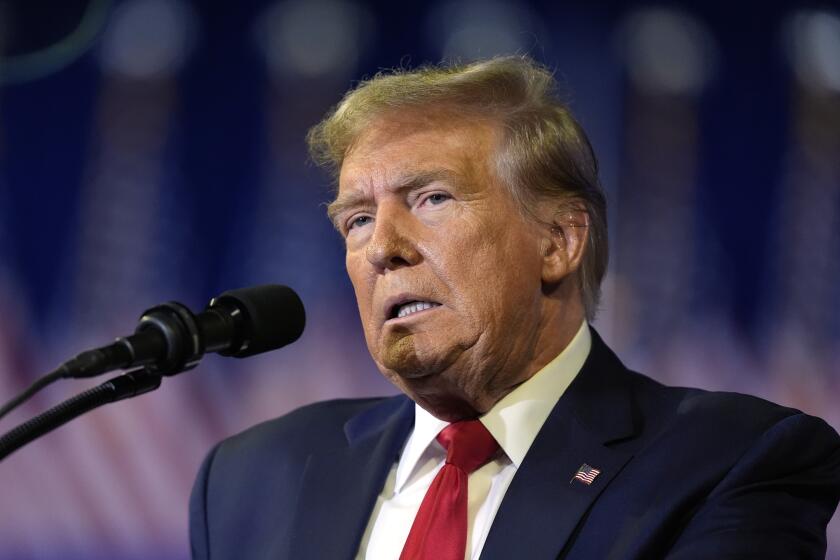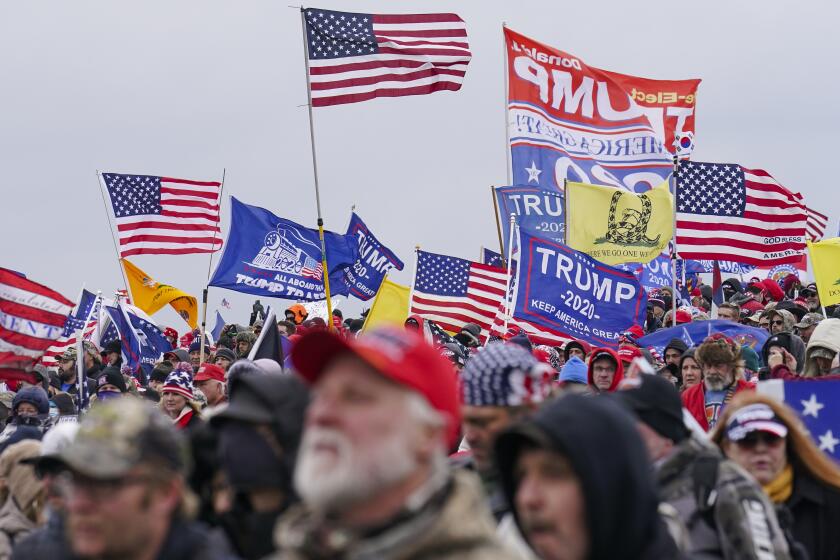Trump wants a pause on his Jan. 6 trial. The Supreme Court should barrel ahead

- Share via
The Trump legal whirlwind continues, and the former president’s Monday Supreme Court filing may be the most consequential yet.
Last week, the court heard oral arguments in Trump’s case challenging a Colorado decision to remove his name from that state’s presidential ballot. Now he’s appealing a ruling from the D.C. Circuit Court of Appeals that rejected his argument for immunity from criminal prosecution over his role in the events of Jan. 6, 2021. Importantly, he is also asking the court for a stay of that prosecution while a decision is made.
Trump asks the Supreme Court to extend a trial delay and find him immune from prosecution on charges he plotted to overturn his 2020 election loss.
How the justices react to these two cases will have a huge impact on the Supreme Court’s credibility — not to mention the future of the country. The very principles that seem likely to lead to a ruling in Trump’s favor on the Colorado disqualification case all but require the court to reject his claim of criminal immunity, and quickly at that.
Start with the disqualification case, Trump vs. Anderson. Based on the oral arguments last week, a majority of justices appear likely to vote to reverse the Colorado Supreme Court’s decision to remove Trump from the Colorado ballot. The justices left little doubt as to the main motivation for this outcome: a desire to leave the ultimate choice over Trump’s fitness for the White House up to the American people.
Justice Brett M. Kavanaugh, for example, asked whether “we should think about democracy” and the fact that a ruling disqualifying Trump would have “the effect of disenfranchising voters to a significant degree.” Justice Elena Kagan touched on the same concern when she asked, “Why should a single state have the ability to make this determination not only for their own citizens but for the rest of the nation?”
The justices sound favorable to Trump’s position, suggesting they will clear the way for him to appear on the Colorado ballot despite the Jan. 6 insurrection.
Democratic principles surely represent a value of great importance. But another value seems to be driving the court in the disqualification case: expediency. On that front, it is important to appreciate just how quickly the justices acted in Trump vs. Anderson. The usual time frame for the court to hear oral arguments in a case after a lower court ruling is about a year. But the Colorado Supreme Court ruling came down on Dec. 19, less than two months ago. Clearly, the justices want to resolve the ballot question as soon as possible.
That the justices appear to want to rely on expediency and democratic values to rule for Trump in the disqualification case raises a crucial question: Will they apply similar thinking to his request for criminal immunity and a stay of his trial?
There is little doubt how democratic values apply to these questions. Allowing Trump’s prosecution to move forward would permit the American people to have the final say over his criminal liability in at least two crucial ways.
Litman: An appeals court crushed Trump’s immunity claim. He could face trial before the election
The D.C. Circuit Court of Appeals resoundingly rejected the ex-president’s claim of immunity from prosecution for trying to overturn his 2020 election loss.
First, a panel of 12 everyday Americans would get to decide Trump’s guilt or innocence — throughout American history, trial by jury has served as a bastion of democratic self-governance and the rule of law.
Second, if Trump is convicted, the American people would still be able to vote for him in the 2024 presidential election in light of the likely outcome in Trump vs. Anderson. And if enough voters think he should not be punished for his actions surrounding Jan. 6, they can vote him into office where he would presumably pardon himself.
By contrast, if the Supreme Court agrees with Trump’s position on immunity — in essence, that a president cannot be prosecuted for a criminal act committed while he is president — then there is virtually no way for the American people to hold the occupant of the highest office in the land legally accountable, even if, as has been memorably suggested, he were to have a political rival assassinated.
Abcarian: In a righteous world, Trump couldn’t run. Does the Supreme Court live in that world?
The 14th Amendment says no one who engaged or supported insurrection deserves to hold office. That ought to include Trump
The need for expediency is just as clear. If the court were to stay the Jan. 6 prosecution and take many months to come to the conclusion that presidents are not above the law, Trump’s Jan. 6 trial could happen too late in the election cycle for voters to know the outcome.
All of this counsels for the justices to act evenhandedly in these cases, and to do it quickly with due concern for democratic values and efficiency. If the court wishes to reverse the Colorado Supreme Court decision disqualifying Trump from the ballot, it should also refuse to stay Trump’s criminal trial, paving the way for it to proceed quickly and fairly. The court could even issue these decisions on the same day — ideally before the end of the month.
The result would be a split ruling for Trump: Voters would be free to cast their ballots for him and jurors would be free to cast their votes against him.
Most importantly, those decisions would remain with us, the people — and not the nine unelected justices on the Supreme Court.
Aaron Tang is a law professor at UC Davis and a former law clerk to Justice Sonia Sotomayor. He is the author of “Supreme Hubris: How Overconfidence Is Destroying the Court — And How To Fix It.” @AaronTangLaw
More to Read
A cure for the common opinion
Get thought-provoking perspectives with our weekly newsletter.
You may occasionally receive promotional content from the Los Angeles Times.













